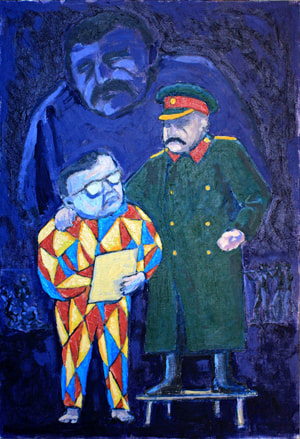Aidan Semmens
 'The emperor's holy fool' - painting by Chris Tyndale-Biscoe
'The emperor's holy fool' - painting by Chris Tyndale-Biscoe
THE PIANIST OF PETROGRAD
the clock you do not hear
strikes a time that cannot come
what he felt as a boy
on the streets was only
a small prelude
to what will happen
you travel with the music
to a very mystical world
where millions of people don’t want to be but
it’s not their decision
he knew already that uninvited guest
death being most unwanted
can visit anyone without exception
walking skeletons, people who are about to die
giving the symphony’s premiere
in a big global space nothing
to do with propaganda
look for the music, don’t look
for the political – comrades
people don’t need your music
not as the guns or bombs
the falling buildings
or the cracking ice
but as Ravel’s Bolero
that is how he hears war
people running, people shooting
it makes powerful sonorities
massive percussive signals
to lie down in hunger, to see
your loved ones starve
to wake with shuddering earth
and the sound
of gulls and crows
crying by the river
left hand crazy as a crossroads demon
dances across the keys
perhaps I should write more slowly
and make fewer mistakes
AVANT-GARDISTS IN THE SERVICE OF THE PROLETARIAT
The artists’ palette is the street – Mayakovsky
and, Vladimir Vladimirovich, if I may
perhaps the windswept steppes and forest too
the dinted cornfield
and collective farm –
not giant bogatyrs but peasants now
bestride the land, dwarfing
the trees and distant mills
turning and weaving
useful objects for the new society
faceless, like the looming planes
and airships over palaces
they become geometric abstracts
a woman with a saw
might be holding bunting
or a decorative linen sash
Molodtsova stares back
arms folded, scarf tied neatly
a shockworker stilled
by chickens scratching
by factory walls
before a horse in shafts
beneath a blossoming tree
the new Jerusalem is a shattered
shrine in a forest
brightly coloured onion domes
set at crazy angles
awaiting the wrecking-ball
icons of the new Russia
a madonna and child posed
above blue-painted walls
of an elegant capital
a tram conductor’s
a goddess lit
by electrical flashes, power
of Elijah and Zeus
stretching for the sunlight
of a golden future only just
out of reach, a question
not of style but of commitment
with or without metaphysics
there will be constructive
sculptural forms of furniture
employing no incantations
images to fuel the new myths
blighted as they may be
by hidden meanings
encouraging interpretation
we will make it the way it is
and it will not be what you need
similarity to realism will not save us
until the style of the new epoch
becomes clear – the new hero
not a person but a people
or a class of people, overcoming weakness
of character and flesh, social material
within a shared forcefield
a formula superceding
all the elements of nature
heads as of wood or stone become
components in an intricate design
your peasant is not so interested
in suprematism or form –
but please do not gossip, the deceased
dislike that sort of thing terribly
the clock you do not hear
strikes a time that cannot come
what he felt as a boy
on the streets was only
a small prelude
to what will happen
you travel with the music
to a very mystical world
where millions of people don’t want to be but
it’s not their decision
he knew already that uninvited guest
death being most unwanted
can visit anyone without exception
walking skeletons, people who are about to die
giving the symphony’s premiere
in a big global space nothing
to do with propaganda
look for the music, don’t look
for the political – comrades
people don’t need your music
not as the guns or bombs
the falling buildings
or the cracking ice
but as Ravel’s Bolero
that is how he hears war
people running, people shooting
it makes powerful sonorities
massive percussive signals
to lie down in hunger, to see
your loved ones starve
to wake with shuddering earth
and the sound
of gulls and crows
crying by the river
left hand crazy as a crossroads demon
dances across the keys
perhaps I should write more slowly
and make fewer mistakes
AVANT-GARDISTS IN THE SERVICE OF THE PROLETARIAT
The artists’ palette is the street – Mayakovsky
and, Vladimir Vladimirovich, if I may
perhaps the windswept steppes and forest too
the dinted cornfield
and collective farm –
not giant bogatyrs but peasants now
bestride the land, dwarfing
the trees and distant mills
turning and weaving
useful objects for the new society
faceless, like the looming planes
and airships over palaces
they become geometric abstracts
a woman with a saw
might be holding bunting
or a decorative linen sash
Molodtsova stares back
arms folded, scarf tied neatly
a shockworker stilled
by chickens scratching
by factory walls
before a horse in shafts
beneath a blossoming tree
the new Jerusalem is a shattered
shrine in a forest
brightly coloured onion domes
set at crazy angles
awaiting the wrecking-ball
icons of the new Russia
a madonna and child posed
above blue-painted walls
of an elegant capital
a tram conductor’s
a goddess lit
by electrical flashes, power
of Elijah and Zeus
stretching for the sunlight
of a golden future only just
out of reach, a question
not of style but of commitment
with or without metaphysics
there will be constructive
sculptural forms of furniture
employing no incantations
images to fuel the new myths
blighted as they may be
by hidden meanings
encouraging interpretation
we will make it the way it is
and it will not be what you need
similarity to realism will not save us
until the style of the new epoch
becomes clear – the new hero
not a person but a people
or a class of people, overcoming weakness
of character and flesh, social material
within a shared forcefield
a formula superceding
all the elements of nature
heads as of wood or stone become
components in an intricate design
your peasant is not so interested
in suprematism or form –
but please do not gossip, the deceased
dislike that sort of thing terribly
Copyright © Aidan Semmens 2017
Aidan Semmens is the editor of Molly Bloom. These poems are from his fourth collection, Life Has Become More Cheerful, forthcoming from Shearsman Books to mark the centenary of the Russian Revolution.

